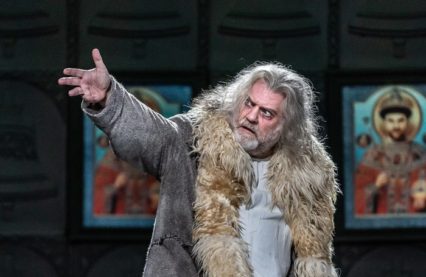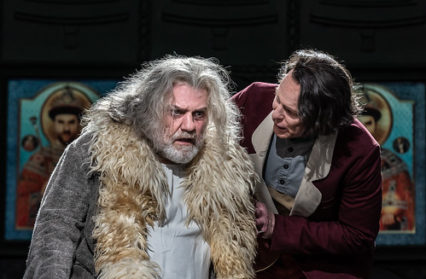David Truslove casts his critical eye over Modest Mussorgsky’s Boris Godunov, the latest production from the Royal Opera House to feature Bryn Terfel.

Copyright Royal Opera House 2019. Photographed by Clive Barda
This revival of Richard Jones’s 2016 production of Boris Godunov brings another opportunity to see Mussorgsky’s first version of his clunky masterpiece drawn from Pushkin’s tragedy and completed in 1869. Essentially, it’s a portrait of a conscience-stricken tsar whose psychological disintegration is prompted by past burdens. This raw, compact version in seven scenes, lasting just over two hours without a break, is the lesser performed version of several that include the composer’s “definitive” version finished three years later, and the three-act arrangement by Rimsky-Korsakov of 1908. After a period of neglect following Mussorgsky’s death in 1881, the opera’s fortunes were resuscitated when the rising star Fyodor Shalyapin took the title role at a performance in Moscow, since which time the work became inextricably linked with this legendary bass.
At the centre of this first revival is the charismatic presence of Bryn Terfel who brings Mussorgsky’s tormented tsar into sharp focus. His appearance, coincidentally, is not unlike the famous portrait of the composer by the Russian painter Ilya Repin, memorable for the wild staring eyes, unkempt hair and sallow, drink-befuddled complexion. With no slur intended, Terfel is in his element here, consistently commanding the stage with masterly guilt-ridden expression and nervous movements that fit this complex yet doomed character like a glove. With this opera’s anti-theatrical focus foregrounding onstage reactions to offstage events, Terfel is ideally cast for the brooding intensity vital to this role, so too paternal humanity for his children and an honourable attitude for Russia’s ordinary people who anoint him, Tsar. His progressive mental decline is hastened by the novice monk Grigory bent on avenging the murder of Ivan the Terrible’s son Dimitri – the true heir to the throne and supposedly killed on the orders of Boris.
Much of the conspiratorial darkness of this production belongs to Miriam Buether’s two-tier design; a vaulted upper room, its tiled walls reminiscent of a municipal swimming pool, which doubles as a playroom where the young Dimitri is assassinated (and menacingly re-enacted), a boyars council chamber and border control security checkpoint. Below this, a mostly bare stage serves as a children’s classroom (complete with a giant map of Russia), monastery, tavern and public square. Before any action has begun, a child’s spinning top confronts us and periodically reappears to an increasingly traumatised Boris.
While historical events refer to the late 16th century and the era is known as the Time of Troubles, Jones’s set conjures an unspecified timeframe and Nicky Gillibrand’s costumes are a blend of traditional and contemporary. Only the grandeur of the colourful coronation scene brings relief from the ubiquitous slate greys and the whole is atmospherically lit by Mimi Jordan Sherin.
What sustains the dramatic momentum of this singular, if episodic, narrative are well-defined characterisations from an impressive cast with several singers reprising roles from the first production. Performances, therefore, are well and truly bedded in. In addition to Bryn Terfel’s noble and tenderly sung Boris is Matthew Rose’s rich-toned monk Pimen, whose chronicles to Grigory Otrepiev (a resonant David Butt Philip) set in motion a false claim to the throne. Other cameos include Roger Honeywell as a slippery Prince Shuisky and the veteran John Tomlinson comfortably reprising his 2016 role as the drunken monk Varlaam, whose savvy during the inn scene, after realising he’s being taken for a mug by Grigory, produces a witty appeal to the border guards; ‘I may not be a fluent reader but if it’s a matter of life and death…’ A rare moment of Falstaffian humour and a welcome, if small, chink of light in an otherwise chain of ominous tableaux.
Anne Marie Gibbons as the Innkeeper, Sam Furness as the Holy Fool and Joshua Adams as Boris’s son Fyodor make strong impressions, as do a well-drilled and expanded chorus as stoic peasants whose hymn-like singing outside St Basil’s Cathedral stirs the senses – just a pity their deployment in rows of four lines is so unimaginative. Down in the pit, Marc Albrecht flawlessly weaves together all the musical elements, the Royal Opera House orchestra keenly responsive to Mussorgsky’s intriguing blend of folk and chant inspired music.
But it is Terfel whose intensely wrought account consistently claims attention, compelling our sympathy from the beginning, and nowhere more so than his distraught final scene with his son prior to his own untimely death. On this showing, Terfel’s name must surely be included as one of the world’s legendary performers of Boris Godunov.
Mussorgsky’s Boris Godunov
[Sung in Russian with English subtitles]
Cast
Boris Godunov– Bryn Terfel
Shchelkalov – Boris Pinkhasovich
Nikitich – Jeremy White
Mityukha – Adrian Clarke
Shuisky – Roger Honeywell
Pimen – Matthew Rose
Otrepiev – David Butt Philip
Varlaam – John Tomlinson
Missail – Harry Nichol
Inn Hostess – Anne Marie Gibbons
Holy Fool – Sam Furness
Boyar – Christopher Lemmings
Fyodor – Joshua Abrams
Xenia’s Nurse – Fiona Kimm
Director – Richard Jones
Associate Director – Gerard Jones
Set Designer – Miriam Buether
Costume Designer –Nicky Gillibrand
Lighting – Mimi Jordan Sherin
Chorus and Orchestra of the Royal Opera House
Conductor – Marc Albrecht
The Royal Opera House website has regular updates on its future and current productions.
David Truslove is a regular contributor to Wales Arts Review.











